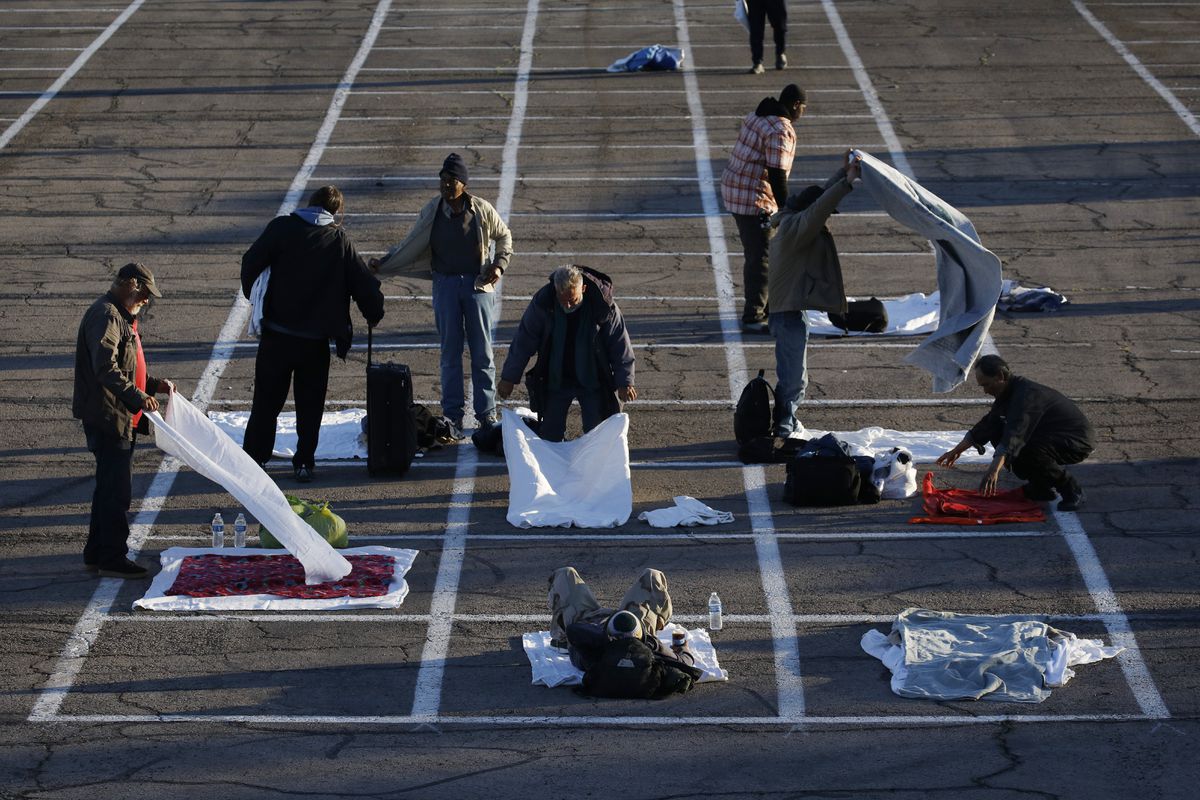In a Las Vegas parking lot, homeless people prepare to sleep within painted squares to ensure social distancing. Officials turned part of the lot into a makeshift camp after a man staying at a local shelter tested positive for COVID-19.
John Locher/The Associated Press
John Rapley is a political economist at the University of Cambridge and the author of Twilight of the Money Gods: Economics as a Religion and How it all Went Wrong.
“The economy is going to do very well,” President Donald Trump said last month, when asked what impact coronavirus would have on the economy. Echoing a common narrative – that shocks and recessions are mere pauses in the relentless advance of a nation destined to greatness – he predicted the United States would experience “a big bounce” as soon as businesses reopened.
When I later discussed this with my parents, my father resorted to a Yiddish proverb he uses in times like this: Man plans, God laughs.
Sure, we’ll emerge from this pandemic. We may even emerge better. But the world we behold on the other side of this crisis will probably look very different from the one we’ve known.
For a long time, a handful of Western countries have enjoyed most of the planet’s wealth. Within them, a few people at the top grew richer than everyone else. But it now appears that a microscopic organism may have ravaged all this, in the space of what was really just a few days.
Throughout history, plagues have played the part of great levellers – toppling regimes, upending hierarchies, even destroying civilizations. COVID-19 looks set to reprise that role.
It will narrow the gap between rich and poor countries while, in the West, it will reverse the trend of recent decades in which the few got richer and most others got by.
In that respect, you can think of this plague as the denouement of a 200-year-long story – not one of relentless advance, but of the rise, triumph and sudden fall of a way of life.
An 1835 engraving by Joseph Wilson Lowry shows a textile factory in the early decades of the Industrial Revolution. Factories like this brought tremendous wealth to the countries that first adopted them, like Britain and the United States, but inequality there and around the world also grew sharply.
Photos.com/Getty Images
The West in its youth
Let’s go back to the story’s beginning, about two centuries ago, when the modern world began to emerge. Around 1800, there weren’t really rich and poor countries. Across the globe, average per capita incomes stood at more or less the same level. But over the next two centuries, as the European empires spread across the planet, their economies blossomed and the U.S. grew into a superpower, the West ascended until it ultimately became the richest and most technologically advanced society history had ever known. At our peak, at the end of the 20th century, we in the West consumed four-fifths of the planet’s output, and workers in Western countries earned up to 50 times what their counterparts in the developing world did. We took this to be the natural order and few of us had any reason to suppose it would ever end.
Yet in the deeper currents of the global economy, things were starting to change. Put simply, Western societies were starting to show their age. Literally, in that the share of the population that was retired was growing larger by the year. But also figuratively, in that the scientific and technological breakthroughs that had earlier transformed human productivity were no longer producing similarly radical changes. Economic growth was slowing.
In consequence, Western governments faced a problem. They had to find a way to support a growing population that wasn’t working, but a slowing economy wasn’t going to cut it. All the while the citizens of the West, now used to generations of rising prosperity, expected more of the same. Confronted with these demands, governments had to find a way to breathe new life into their economies.
Opportunity beckoned in all those poor countries. They were younger, after all. They had lots of inexpensive workers, and the earlier technological innovations were now spreading there, with the expected transformative effects. If Western societies could find a way to capture some of that energy, reasoned our governments, they might provide themselves with a sort of elixir of life.
So, starting in the last two decades of the 20th century, Western governments encouraged their firms to “outsource” operations to the developing world. Given the savings made by businesses on cheaper wages, they judged that the firms’ profits would rise, giving them new money to invest back home and governments more tax revenues. And it worked. Remember the long stock-market and housing booms? They made many of us richer – including the growing retired population, whose pension funds rode the wave to pay good returns.
But something wasn’t going quite to plan. Yes, the new wave of profit was stimulating investment. But the money wasn’t going so much into new companies as into economic sectors, in particular real estate, which added little new output. People felt richer, but they weren’t necessarily producing more. As a result, economic growth kept slowing in the West, and the developing world began closing the gap. Thus, by the time a novel strain of coronavirus showed up in wet markets in Wuhan, China, last year, the West’s share of the global economic output had already dropped by a quarter.
U.S. President Donald Trump speaks at a ribbon-cutting ceremony the the Louis Vuitton Workshop Rochambeau in Alvarado, Texas, last October. Mr. Trump won election with promises to prevent jobs from going overseas.
Andrew Harnik/The Associated Press
The West in middle age
So enter Mr. Trump, who saw himself taking the stage as the hero who’d save the day. For years, he’d been saying we had to rescue those jobs from China and bring them back home. And when China went into lockdown earlier this year, suddenly choking off the world’s supply of industrial products, his moment seemed to have come. The age of globalization is over, his supporters said. Those jobs would be coming home.
Well, no they wouldn’t. A few will, particularly those in strategic industries such as essential medicines. But most of the jobs that leave China will go mostly to other developing countries (especially those closer to home) – not so much deglobalization as reglobalization. That’s because the forces that drove Western firms to move operations to the developing world in the first place will now grow stronger than ever.
Take debt, for example. We’ve been using cheap credit to maintain our standard of living for years, and now the massive stimulus packages governments are using to stave off economic collapse will get added to the tab. So in Canada, the total stock of debt (public and private) will reach about four times what the country’s economy generates each year. In many developing countries, by contrast, that ratio barely reaches one. And yes, I know, Canadian debts are offset by investments; but the problem is those investments are heavily skewed to sectors, in particular real estate, which won’t be a lot of help in restarting the economy. Compare that with developing countries, where investments tend more toward things such as infrastructure and new factories, which will help those economies ramp up quickly. So while COVID-19 will hit poor countries hard, given their strapped health care systems, once it passes, they’ll probably bounce back. Kind of like an adolescent after the flu.
Western countries, on the other hand, aren’t getting any younger. We will be feeling our aches and pains. You see, one thing COVID-19 has taught everyone – governments, businesses and individuals – is the peril of living too close to the edge. To keep our taxes low, governments cut services to the minimum, only to find they had too few hospitals when a crisis hit. To contain their operating costs, businesses stopped stockpiling supplies and ordering inputs “just in time,” only to find they ground to a halt when their Chinese supplier went offline. To pay for European holidays, individuals dipped into their savings, leaving insufficient reserves when they suddenly lost their jobs.
Stung by this experience, everyone is going to start setting aside rainy-day funds. All of this will add to the costs of running governments, firms and households, and thereby reduce what we’ve got left over to spend. For businesses, building inventories, setting aside cash, diversifying suppliers and bringing some jobs home will all squeeze profits. So they, like the rest of us, will be keen to make savings wherever possible. Using cheap labour wherever possible will remain their best option.
As a result, they’ll continue to outsource work to the developing world – maybe not to China, but there are after all other places beckoning. And let’s be honest. Tempting as it is to blame greedy capitalists for hiring workers in Bangladesh to do jobs for a fiftieth the price of a Canadian, corporate bosses are only doing our bidding. We’re not exactly clamouring for more expensive food, televisions and cellphones. The search for higher profits is driven in no small part by the large institutional investors that keep Westerners in the style to which we’ve grown accustomed, with the pension funds that support a growing share of our population leading the charge. With futures markets now predicting it will take as much as a decade for the profits of Western companies to recover from the crisis, the move of capital toward the global periphery will only intensify.
Workers in Handan, in China’s Hebei province, produce baby carriages on April 29. China began to restart its factories in March to revive its economy after the COVID-19 pandemic.
AFP via Getty Images
The West in its dotage
However, this won’t amount to a return to business-as-usual. By moving factory jobs offshore but keeping professional ones, such as teaching and engineering, at home, globalization hammered the workers but benefited the middle class. Reglobalization will flip this around. A few factory jobs will come home (although it’s possible some of them will get replaced by robots), reversing the long decline in real wages at the lower end of the scale. So to make up the added costs, companies may begin shifting some highly skilled jobs offshore for the first time. Necessity being the mother of invention, COVID-19 forced a massive shift to tele-working. It isn’t just private firms holding meetings over Zoom and getting people to work from home – it’s also civil servants and teachers. Now that they’ve done it, managers and politicians will see the virtue of continuing at least some of their operations that way when the crisis has passed – not only because it reduces costs (including office space), but also because it will improve resilience for future crises. And when you don’t need your employees to come into the office, what’s to stop you hiring someone on the other side of the planet at a fraction the cost of your local staff?
Adding to the concerns of those at the upper end of the income scale will be the strong possibility that the real estate and stock-market booms, which benefited so many salaried and older citizens who owned homes or other investments, may now have run their course. All that extra government debt will put upward pressure on either inflation or interest rates, or possibly both. Higher interest charges will slow down credit-fuelled housing activity. Higher inflation, especially during a period when profits are expected to remain low, will push up the cost of living faster than the income from investments. House prices and share portfolios – and with them, the value of pensions – may not actually fall. But over time, their value may be worn down by the rising cost of living, similar to what happened in the 1970s.
Like an aging lothario who tried too hard to preserve his youth, age caught up with the West. But we still have our best years ahead, if we play our cards right. For starters, the community solidarity we rediscovered amid this crisis, when it became painfully apparent that nobody was safe until everyone was safe, could provide the foundations for a better society. And we’re going to need that spirit of unity right away, because in the initial stages of the transition to this new era, most everyone will share in the pain.
The “V-shaped” recovery that many economists and politicians had looked for in the early stages of the pandemic – a short but sharp recession followed by a quick return to normality – now looks unlikely. Barring a dramatic scientific breakthrough, such as record-breaking speed in finding a vaccine or cure, or the discovery that most of the population has already caught COVID-19 and we’re now approaching “herd immunity,” we’ll probably have to get used to more of the same. When economies reopen for business, they’ll probably do so slowly, with possible periodic lockdowns to snuff out any signs of a resurgence of infections. Solidarity rather than schadenfreude should mark the next few years. To judge by the widespread sacrifice Western citizens are currently showing they’re willing to make for the collective good, there are grounds to hope we might just pull together and build a better society out of this harrowing experience.
Prior to this crisis, governments, businesses and ordinary citizens in the West were all living as if the dramatic gains of the past two centuries would be eternal – cutting taxes in the expectation there would be no more recessions, or running up huge debts in the expectation our houses would only ever go up in value. Pride goes before a fall. If one legacy this crisis bequeaths to us is a bit more humility in our expectations of what the future will give to us, and a bit less selfishness in the way we look out for one another, then perhaps some good will yet come out of this very difficult time.
Keep your Opinions sharp and informed. Get the Opinion newsletter. Sign up today.











